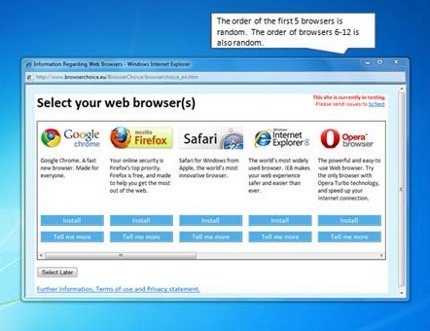IE to lose Windows monopoly next week

Microsoft will start offering some European Windows users a choice of web browser next week, the company announced on Friday, as it starts to publically test its legally mandated browser ballot process.
The ballot screen, which follows extensive negotiations between Microsoft and the European Commission, is still being tested internally at the company, but will see its first external testing in the week beginning 22 February, before a wider European rollout that will start around 1 March.
In the external testing phase, Windows users who have Internet Explorer set as their default browser will be able to voluntarily download the browser ballot through Windows Update. The update, which presents an information screen about browser choice before displaying the ballot screen itself, will be rolled out from the following week.
Chrome, Firefox, Opera and Safari are among the browsers to be presented to users. According to the latest statistics from Statcounter, IE currently has a 45.5 percent browser market share in Europe, followed by Firefox with 39.2 percent, Chrome with 6.3 percent, Opera with 4.3 percent and Safari with 3.7 percent.
"The browser choice screen... will present you with a list of leading browsers," Microsoft deputy general counsel Dave Heiner wrote in a blog post. "In keeping with our agreement with the European Commission, this list is presented in random order.

"You can also scroll to the right to see additional browsers, which are also presented in random order. The browsers that are listed and the content relating to them will be updated from time to time."
The browser ballot update will also automatically unpin IE from Windows 7 taskbars, Heiner said.
In January 2009, the Commission told Microsoft that the bundling of Internet Explorer with Windows contravened EU antitrust legislation. Microsoft then proposed shipping Windows 7 with no browser at all, but the Commission remained dissatisfied with this solution.
Microsoft subsequently proposed the ballot screen, which would offer IE alongside a variety of competing browsers. The Commission accepted this proposal, saying it settled its antitrust concerns.
Under the terms of the deal between the Commission and Microsoft, the ballot screen will be presented to European users of Windows XP, Windows Vista and Windows 7 for five years, using the Windows Update mechanism. The settlement also allows PC manufacturers to turn IE off, setting a rival browser as default.
Microsoft has not yet confirmed which day next week it will make the update available, a company spokesperson told ZDNet UK on Friday.